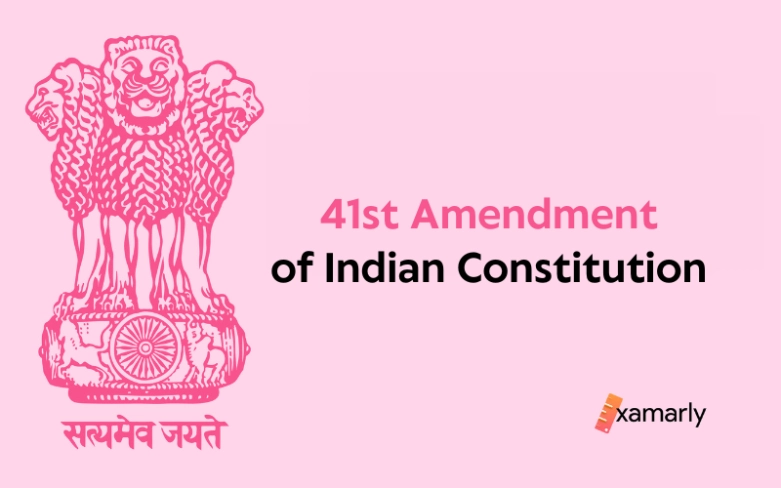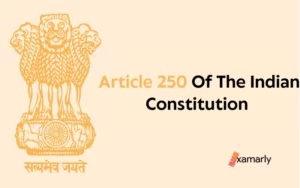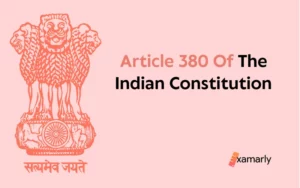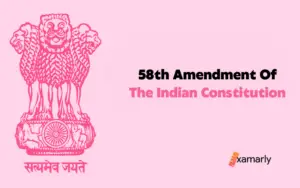The 41st Amendment of the Indian Constitution is officially known as THE CONSTITUTION (FORTY-FIRST AMENDMENT) ACT, 1976. The Constitution’s Article 316(2) was modified by this modification. As a result, the State Public Service Commissions’ chairman and members’ retirement age was raised from 60 to 62.
Continue reading this article on the 41st amendment of the Indian Constitution. This will enable you to learn more about the Indian Constitution from the UPSC point-of-view.
- 41st Amendment of Indian Constitution
- Statement of Objects and Reasons
- Key Points of the 41st Amendment of Indian Constitution
- Important Provisions of the 41st Amendment of Indian Constitution
- Summary
- FAQs on the 41st Amendment of Indian Constitution
- Who can introduce constitutional amendment bill?
- What is Article 316 of the Indian Constitution?
- What is the purpose of Article 316?
- Are there any qualifications for the appointment of members of the state public service commission?
- How long can a member of the state public service commission hold office?
41st Amendment of Indian Constitution
On 7 September 1976, the 41st Amendment came into effect. On August 26, 1976, the Constitution (Forty-third Amendment) Bill, also known as the Constitution (Forty-first Amendment) Act, was introduced in the Lok Sabha. Om Mehta, a minister of state in the home affairs ministry at the time, introduced it.
This aimed to change Article 316(2) of the Constitution. The State Public Service Commission and Joint Public Service Commission members’ retirement age was increased from 60 to 62 by the 41st amendment to the Indian Constitution.
Also read about: Powers and Functions of Lok Sabha and Rajya Sabha.
Statement of Objects and Reasons
- Under Article 316(2) of the Constitution, the State Public Service Commission or Joint Commission Chairman and Members leave at 58 or six years after starting office, whichever comes first. When the Constitution went into effect, this situation existed.
- The High Court Judges’ retirement age was raised to 58. In contrast, it remained the same for the Chairman and Members of the State Public Service Commissions.
- According to the same law, each Public Service Commission must include half of its members who work for the Indian government or a state government. Originally, 55 was the retirement age for government workers.
- However, it was eventually amended to 58 for employees of the All-India Services, the Central Government, and numerous States governments. They are consequently uninterested in joining the Commission. This is due to the fact that they will only have two years to serve, a position that is undesirable from the perspective of the efficient functioning of the Commission.
- State public service commissions can nominate academics. University professors now retire at 58. Academics won’t join a Public Service Commission if the retirement age stays sixty.
- After retirement, the chairman or members of the State PSC are not permitted to work for the Union of India or a State Government.
- Thus, very few to none of the distinguished academicians will eagerly accept an appointment to the Commission as long as the retiring age isn’t raised to 62.
- The idea is to make the State Public Service Commission’s Chairman and Members’ retirement age 62.
This suggestion was intended to be implemented through the Bill.
You might like to read our blogs on:
Key Points of the 41st Amendment of Indian Constitution
| Who introduced it? | Om Mehta, then Minister of State in the Ministry of Home Affairs. |
| When it was Introduced? | In the Lok Sabha on 26 August 1976. |
| The official name of the Amendment | THE CONSTITUTION (FORTY-FIRST AMENDMENT) ACT, 1976. |
| Which articles were amended? | Article 316(2). |
Important Provisions of the 41st Amendment of Indian Constitution
Amendment of Article 316
- In article 316 of the Indian Constitution, the term “60 years” will be replaced with “62 years” in clause (2).
- Article 316(2) of the Constitution has been amended to raise the age of retirement of the Chairman and Members of the State Public service Commissions from 60 to 62 years.
Read Also:
Summary
The 41st Amendment went into effect on 7 September 1976. With this modification, the retirement age for chairmen and members of joint public service commissions and state public service commissions is raised from sixty to sixty-two.
Check our blogs on the:
- Previous Amendment: 40th Amendment of Indian Constitution.
- Next Amendment: 42nd Amendment of Indian Constitution.
FAQs on the 41st Amendment of Indian Constitution
Who can introduce constitutional amendment bill?
As per Article 368 of the Indian Constitution, a constitutional amendment bill can be introduced in the Parliament of India by any member of either house of Parliament, that is, the Lok Sabha (lower house) or the Rajya Sabha (upper house).
What is Article 316 of the Indian Constitution?
Article 316 deals with the appointment of members of state public service commissions. It states that the governor of a state shall appoint the chairman and other members of the state public service commission.
What is the purpose of Article 316?
The purpose of Article 316 is to provide for an independent and impartial system for the selection of candidates for the civil services in the state.
Are there any qualifications for the appointment of members of the state public service commission?
Yes, there are certain qualifications that a person must meet to be appointed as a member of the state public service commission. These include being a citizen of India, having held a judicial or administrative office for at least ten years, or having been a member of a state public service commission or the Union Public Service Commission.
How long can a member of the state public service commission hold office?
A member of the state public service commission can hold office for a term of six years or until they reach the age of 62, whichever comes first.






